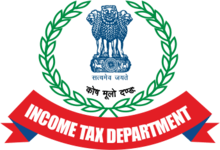The Income-tax Act, 1961
The Income-tax Act, 1961 is the changing Statute of Income Tax in India. It provides for levy, administration, collection and recovery of Income Tax. The Government of India brought a draft statute called the "Direct Taxes Code" intended to replace the Income Tax Act,1961 and the Wealth Tax Act, 1957. However the bill was later scrapped. [1]
| The Income-tax Act, 1961 | |
|---|---|
 | |
| Parliament of India | |
Long title
| |
| Citation | Act 43 of 1961 |
| Enacted by | Parliament of India |
| Commenced | 1 April 1962 |
| Status: In force | |

Amendments
The Government of India presents finance bill (budget) every year in the month of February. The finance budget brings various amendments in Income-tax Act,1961 including tax slabs rates[2]. The amendments are generally applicable to the next following financial year beginning from 1 April unless otherwise specified. Such amendments become part of the income tax act after the approval of the president of India.
"The Taxation Laws (Second Amendment) Act, 2016" is an amendment Act, No.48 of 2016, to Income-tax Act, 1961 and The Finance Act, 2016. It was passed during the 2016 Winter Session of Indian Parliament.[3] The Taxation Laws (Second Amendment) Bill, 2016 was passed in Lok Sabha as a money bill on 29 November 2016 enabling people to declare their undisclosed incomes after Indian 500 and 1000 rupee note demonetisation.[4][5]
The Taxation Laws (Second Amendment) Bill, 2016, was introduced in the Lok Sabha during the 2016 Winter Session of Indian Parliament.[6] The bill was introduced on 28 November 2016, by Finance Minister of India, Arun Jaitley.[7] The bill was passed by Speaker Sumitra Mahajan, with a voice vote without debate in Lok Sabha.[8][9][10] The Government, clarified that gold asset in form of jewellery of people of India, were not for taxation as per the introduced Bill.[11] The Opposition, parties, expressed anger against the passed bill in Lok Sabha, that a debate was not held.[12]
Simplification
Union Government sets up Arbind Modi-led panel to overhaul, simplify income tax laws. On 22 November 2017, the government formed a task force to draft a new direct tax law to replace the existing Income Tax Act, which has been in force since 1961. Arbind Modi, Member, Central Board of Direct Taxes (CBDT), will lead a six-member panel. Chief Economic Advisor Arvind Subramanian will be apermanent special invitee on the panel.[13]
Notes
- "Archived copy". Archived from the original on 18 June 2010. Retrieved 20 May 2010.CS1 maint: archived copy as title (link)
- Galactic https://www.thegalacticadvisors.com/tax-rates-individual. Missing or empty
|title=(help) - "Taxation Laws second amendment bill passes in Lok Sabha". Indian Express. 30 November 2016.
- "Parliament Winter Session: Govt keen on proper discussion on GST Bills", The Indian Express, 29 November 2016
- "Lok Sabha passes Bill to tax black money deposits post demonetisation", The Times of India, 29 November 2016
- "Lok Sabha passes IT amendment bill". Hindustan Times. 29 November 2016.
- "Lok Sabha passes Income Tax amendment bill". The Times of India. 29 November 2016.
- "Amendment Bill, will tax undisclosed money". Economic Times. 1 December 2016.
- "Bill to tax deposits". The Hindu. 29 November 2016.
- "No debate on Taxation laws bill". Indian Express. 30 December 2016.
- "Government clears, questions of taxation laws". Business Standard. 1 December 2016.
- "Opposition protest on Bill". Indian Express. 30 November 2016.
- "Govt sets up Arbind Modi-led panel to overhaul, simplify income tax laws", Business Standard, 23 November 2017